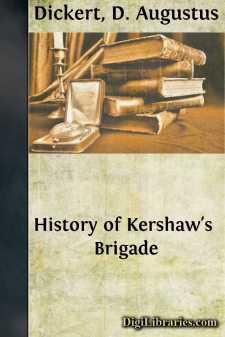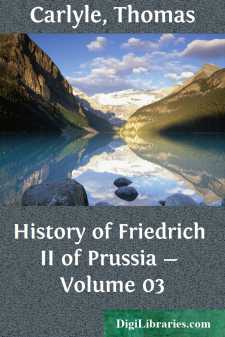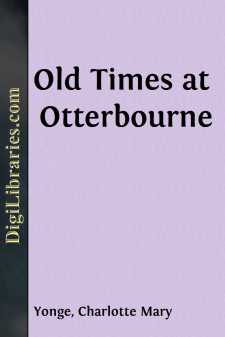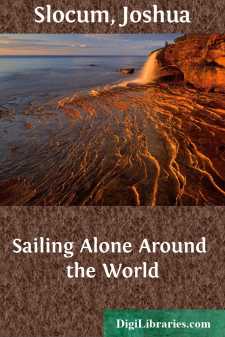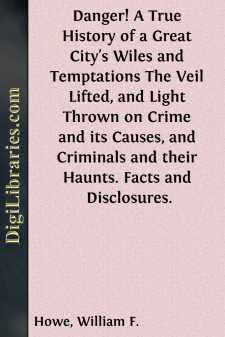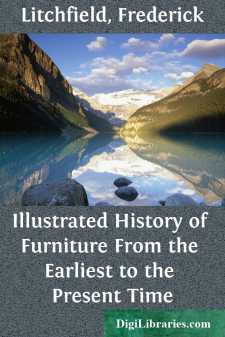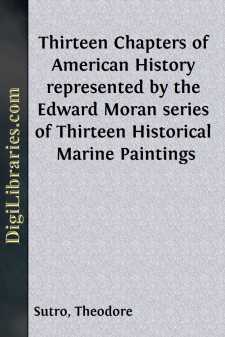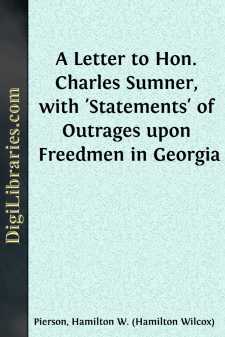History
- Africa 30
- Americas (North Central South West Indies) 50
- Ancient 68
- Asia 58
- Australia & New Zealand 8
- Canada 41
- Caribbean & West Indies 1
- Civilization 20
- Eastern Europe 12
- Europe 310
- Expeditions & Discoveries 60
- General 77
- Historical Geography 1
- Jewish 9
- Latin America 3
- Medieval 8
- Middle East 13
- Military 248
- Revolutionary 8
- Study & Teaching 5
- United States 353
- Western Europe 56
- World 13
History Books
Sort by:
INTRODUCTION. For three reasons, one purely personal (as you will soon see), I am pleased to play even a small part in the reprinting of D. Augustus Dickert's The History of Kershaw's Brigade ... an undertaking in my judgment long, long, overdue. First, it is a very rare and valuable book. Privately published by Dickert's friend and neighbor, Elbert H. Aull, owner-editor of the...
more...
Andrew Jackson March 4, 1833, to March 4, 1837 FELLOW-CITIZENS: The will of the American people, expressed through their unsolicited suffrages, calls me before you to pass through the solemnities preparatory to taking upon myself the duties of President of the United States for another term. For their approbation of my public conduct through a period which has not been without its...
more...
by:
Thomas Carlyle
Chapter I. — KURFURST FRIEDRICH I. Burggraf Friedrich, on his first coming to Brandenburg, found but a cool reception as Statthalter. ["Johannistage" (24 June) "1412," he first set foot in Brandenburg, with due escort, in due state; only Statthalter (Viceregent) as yet: Pauli, i. 594, ii. 58; Stenzel, Geschichte des Preussischen Staats (Hamburg, 1830, 1851), i. 167-169.] He came as...
more...
I adopt a course different from that recently pursued by several of my contemporaries; I publish my memoirs while I am still here to answer for what I write. I am not prompted to this by the weariness of inaction, or by any desire to re-open a limited field for old contentions, in place of the grand arena at present closed. I have struggled much and ardently during my life; age and retirement, as far...
more...
Not many of us remember Otterbourne before the Railroad, the Church, or the Penny Post. It may be pleasant to some of us to try to catch a few recollections before all those who can tell us anything about those times are quite gone. To begin with the first that is known about it, or rather that is guessed. A part of a Roman road has been traced in Otterbourne Park, and near it was found a piece of...
more...
by:
Joshua Slocum
CHAPTER I A blue-nose ancestry with Yankee proclivities—Youthful fondness for the sea—Master of the ship Northern Light—Loss of the Aquidneck—Return home from Brazil in the canoe Liberdade—The gift of a "ship"—The rebuilding of the Spray-Conundrums in regard to finance and calking—The launching of the Spray. In the fair land of Nova Scotia, a maritime province, there is a ridge...
more...
by:
William F. Howe
PREFACE. It may not be amiss to remark, in explanation of the startling and sensational title chosen for this production, that logic has not yet succeeded in framing a title-page which shall clearly indicate the nature of a book. The greatest adepts have frequently taken refuge in some fortuitous word, which has served their purpose better than the best results of their analysis. So it was in the...
more...
Chapter I. Ancient Furniture. Biblical References: Solomon's House and Temple—Palace of Ahashuerus. Assyrian Furniture: Nimrod's Palace—Mr. George Smith quoted. Egyptian Furniture: Specimens in the British Museum—the Workman's Stool—various articles of Domestic Furniture—Dr. Birch quoted. Greek Furniture: The Bas Reliefs in the British Museum—the Chest of Cypselus—Laws and...
more...
by:
Theodore Sutro
INTRODUCTORY. The Thirteen Paintings, to a history and description of which (and incidentally to a brief memoir of their creator, Edward Moran) these pages are devoted, are monumental in their character and importance. Mr. Moran designated them as representing the "Marine History of the United States." I have somewhat changed this title; for even the untraversed "Ocean" and the landing...
more...
LAWLESSNESS IN GEORGIA. Washington, D. C., March 15, 1870. My Dear Sir: It would not become me to express an opinion upon any of the legal questions involved in the Georgia bill now before the Senate, but I respectfully call your attention to the following "statements" of facts. I certainly am not surprised that Honorable gentlemen whom I greatly esteem, should express their belief that the...
more...


